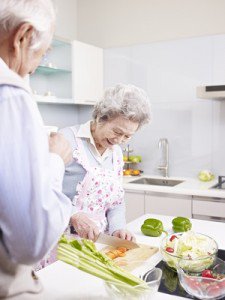
Eat healthy to improve immunity, energy & quality of life
While healthy eating is recommended for all ages, it becomes more important the older you get. For adults 50 and over, eating healthy can help you stay mentally sharp, give you higher energy levels, improve your immune system, and keep chronic health problems at bay.
While healthy eating is not the same as dieting, it is important to know that the number of calories your body needs to sustain itself decreases as you get older. Women over 50 who are not physically active need approximately 1600 calories a day. This rises to 1800 if you are somewhat active and 2000 if you are very active. Men over 50 who are not physically active need approximately 2000 calories a day. This rises to 2200-2400 for men who are somewhat active, and 2400-2800 for those who are very active.
One of the most important aspects of your diet if you are over 50 is your fiber intake. Foods high in dietary fiber can boost your immune system, improve your skin health, aid in weight loss, and lower your risk for stroke, diabetes, and heart disease. Women over 50 should aim to ingest 21 grams of fiber per day, and their male counterparts should have 30 grams. Healthy sources of fiber include oatmeal, beans, nuts, and whole grains, as well as celery, carrots, tomatoes, pears, apples, berries, and citrus fruits.
However, this does not mean you should be on a strictly vegetarian diet, as protein is a very important part of a healthy diet. Eating high-quality proteins will help you stave off muscle loss and maintain your physical health as you age. Examples of high-quality proteins include fish, poultry, beans, nuts, seeds, low-fat dairy, tofu, and soy products. It is recommended you avoid red meat and commercially processed meat products, due to their potential to increase your risk of heart disease and cancer. Adults over 50 should consume 1 to 1.5 grams of protein per kilogram of their body weight each day. (That is somewhere between 68 to 102 grams of protein per day for a 150 pound person.)
Finally, it is vitally important that older adults drink enough water. As you age, your body loses some of its ability to regulate fluid levels, which translates into you not sensing thirst as acutely as you did when you were younger. By drinking approximately 8 ounces of water each day per 20 pounds of your body weight, you will avoid the multitude of health issues that come with dehydration, such as urinary tract infections, constipation, and mental confusion.


